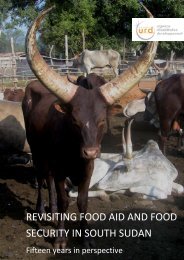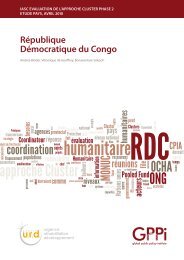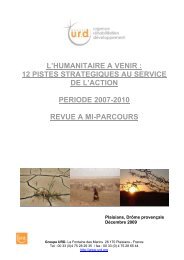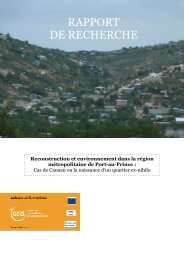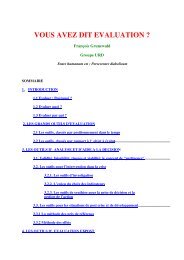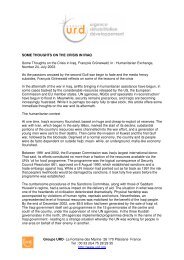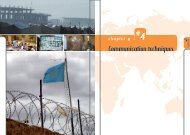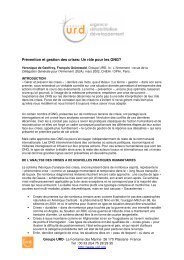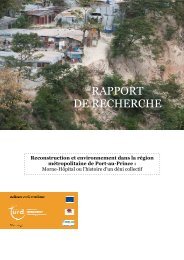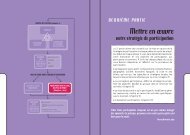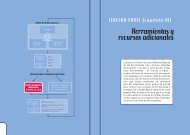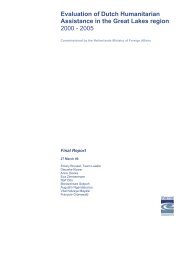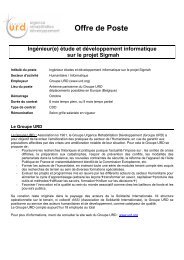Kabul Urban Survey - Groupe URD
Kabul Urban Survey - Groupe URD
Kabul Urban Survey - Groupe URD
Create successful ePaper yourself
Turn your PDF publications into a flip-book with our unique Google optimized e-Paper software.
6 URBAN MECHANISMS<br />
Various urban development mechanisms are being operated in parallel at different levels of<br />
decision making and at different levels of spatial strategy.<br />
6.1 Different decision-making levels<br />
All urban actors need to provide an answer to the following question: Who is in charge of<br />
each step of programming decision making and project implementation? The question<br />
remains open in <strong>Kabul</strong> with a lot of discussions as related above this document. “Who builds<br />
a city?” 47 is another way of looking at the question of urban governance as Tom Sacher 48<br />
writes in his report of <strong>Kabul</strong> issues.<br />
6.1.1 At a national level and international control<br />
In this period of institutional reconstruction, international assistance plays a major role in<br />
supporting policy decisions and the different stakeholders involved in Afghan urban<br />
reconstruction. The <strong>Kabul</strong> Municipality, the Government of Afghanistan, the MoUD and all<br />
the other ministries concerned have held several consultative working groups and meetings<br />
since 2001 with the international community, advisors and financial partners, such as UN-<br />
HABITAT, UNDP, AKTC, and different donors, such as the European Commission, WB, GTZ<br />
and ADB. After five years, the MoUD is starting to introduce reforms in its staffing policy and<br />
its processes, but at present, financial issues are still the responsibility of international<br />
stakeholders. Plans made at a political level must then be aligned with the available budget<br />
and international conditions. Moreover, the capacity for urban governance has been<br />
strengthened with urban institutions but in <strong>Kabul</strong>, the operational capacity of the MoUD<br />
differs from that of other cities, give the specific independent status of the capital.<br />
6.1.2 At the city level<br />
As mentioned before, one of the major difficulties is the lack of urban planning capacity within<br />
the KM. To understand and to cope with this absence of city governance, UN-HABITAT is<br />
currently assessing urban planning skills with its City Profile Programmes. This analysis<br />
process is being piloted in Kandahar, Herat and Jalalabad before it is introduced to <strong>Kabul</strong><br />
Municipality. Its objective is to provide an inventory of fixtures in order to assess the<br />
Municipality’s capacity in implementation, decision making, design and collecting taxes and<br />
where the priorities lie for improving the situation.<br />
6.1.3 At the community level<br />
• Community-based capacity building<br />
Stakeholders are currently considering the possibility of developing community capacity<br />
building with a view to implementing a part of the rehabilitation process directly at the<br />
affected population‘s level. “Community-based urban development programme for <strong>Kabul</strong>:<br />
Building on rural experience” was one of the subjects presented by Mohamad Sharif from<br />
UN-HABITAT at the colloquium on Development of <strong>Kabul</strong> - Reconstruction and Planning<br />
issues in Lausanne. The success of the National Solidarity Programme (NSP), managed by<br />
the Ministry of Rehabilitation and Rural Development (MRRD) for rural sector, has prompted<br />
the idea of adapting this initiative for the urban sector. But, according to UN-HABITAT, there<br />
are two specific problems with this approach:<br />
- The urban population is not so much of a coherent social and cultural group as it tends to<br />
be in villages. Some pilots are being carried out for small programmes in which a<br />
selected group of families are brought together to form Community Development<br />
Councils (CDC).<br />
47 Schacher T., SDC, “Who builds a city?” in “Development of <strong>Kabul</strong> –Reconstruction and planning<br />
issues”, issued from the Section two titled “ Social Challenges for <strong>Kabul</strong>” of the colloquium organized<br />
by MUNTAZ (B)-NOSHIS (K)<br />
48 Tom Sacher works for the Swiss Agency for Development and Cooperation<br />
Page 64



